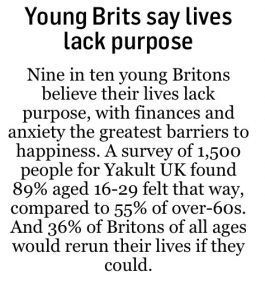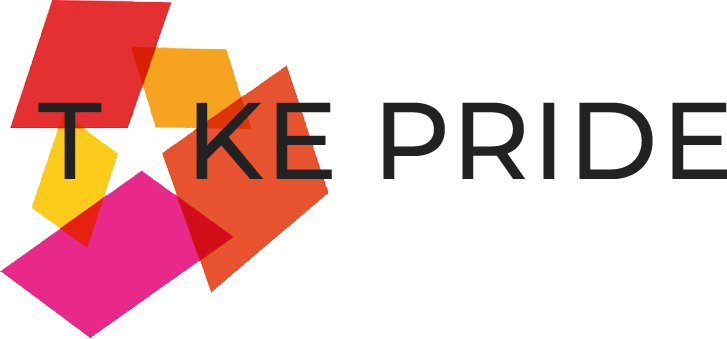It’s almost a year since the publication of my book, Take Pride, during which I have spent a lot of time talking about how to make people and companies more successful. My themes include delivering authenticity behind brand promises, creating positive cultures that are energising, providing a sense of purpose and direction, and above all, dealing with people as individuals rather than “resources”. And I’ve taken these positive messages out to anyone who cares enough about their employees to want to make their experience at work better.
Something I’ve learned is this: to make any impact at all, people need to have guidance and discussion not only to understand the what, but also to solve the harder question: “What next?”
I was reminded of this today with an item in the Sunday Times. The word “purpose” alone would have caught my attention but what reeled me in was the uninspiring and slightly offensive headline: “Young Brits say lives lack purpose”. No insight, no comment – OK it was News in Brief – but I would hardly even describe it as news. It was, in my view, an example of negative stereotyping that young people are already stressing about themselves.
 People who work with them know that the young already have so much to think about. While they are in education it’s all about grades and expectations, belonging, not belonging, and then it’s getting out of school, getting out of home, breaking and then making their own rules. It’s no wonder that purpose isn’t top of their list.
People who work with them know that the young already have so much to think about. While they are in education it’s all about grades and expectations, belonging, not belonging, and then it’s getting out of school, getting out of home, breaking and then making their own rules. It’s no wonder that purpose isn’t top of their list.
But when they do have the time or energy to think about it, of course young people struggle to identify their purpose. Don’t we all? Working out our role in life, our impact, our value to anyone else – these aren’t quick and easy questions to answer. They are important. They need time to percolate. What sort of life you want to lead, the type of person you want to be, what will you be known for – seeking answers to these big questions, in my view, is hardly a negative process. Rather it is a positive sign of emotional intelligence that could lead to a path of greater fulfilment.
One of the outcomes of Take Pride is that more individuals have talked to me about how to find purpose at work, and I have definitely paid more attention this year to helping them deal with “what next?” What I keep coming back to is the following framework for discussion:
– think about what you love doing
– identify the skills that you use when you are doing it
– be honest and realistic about what you are good at
– explore the talents you take for granted
– face up to the areas where you need to be better
– what has made you feel happy/fulfilled/proud in the past
– follow every opportunity to have more of these positive experiences
– grasp every opportunity to learn
There are also some tips I have learned from other people, including my own children, from making mistakes as a parent or friend, and the most important of these is that asking “What next?” i.e. “What are you going to do next?” is too direct and you have to tread carefully, listen to the answers, talk around the topic, allow the conversation to meander, and, finally, make sure you do not try to take over the solutions.
The most insightful book on the topic I have come across recently is The Path to Purpose by William Damon who has plenty to say about life’s most important questions and helping the young find their answers. It was published ten years ago and I am only sorry I hadn’t read Damon’s book before I published my own.
Finally, on a personal note, I still regard purpose as a dynamic factor in our lives and – just like 89% of today’s UK youth – still positively pursue conversations that could lead to a more fulfilling life. I recently joined The Common Room and attended an introductory workshop for members, moderated by Georgina Lee, called Discover your Purpose. Amid some searching conversations with strangers and friends, I was introduced to a toolkit called Value My Skills, which was created by the TUC for people going through midlife career conversations at work. This has helped me identify my own skills set, to focus on what I want to do more/less of and what I want to improve on. Whether you’re 16 or 24, or 35 or 60, time spent on purpose and values is rarely wasted and I would thoroughly recommend a visit to the Common Room to find out more.
I welcome any feedback on the topics I covered here and I will be writing more over the next few weeks on lessons learned from the last year, from Take Pride and other ventures.

